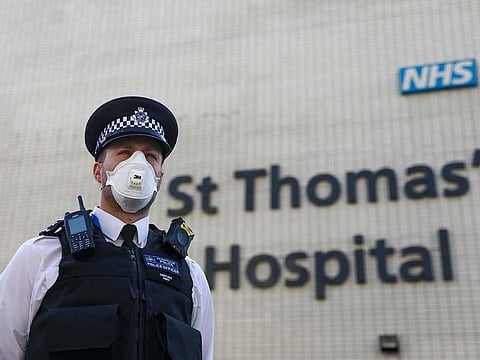UK PM Johnson improving but still in intensive care in COVID-19 fight
Crisis cabinet to discuss future of UK lockdown

London: Prime Minister Boris Johnson had a good night and is getting better four days after being admitted to hospital with COVID-19, but he remains in intensive care as his government reviews the most stringent shutdown in Britain’s peacetime history.
Johnson, 55, was admitted to St Thomas’ Hospital on Sunday evening with a persistent high temperature and cough and was rushed to intensive care on Monday where he has since spent three nights receiving treatment.
Ministers have said he has been sat up in bed and talking to medical staff.
“The prime minister had a good night and continues to improve in intensive care...he is in good spirits,” Johnson’s spokesman said in the latest update on Johnson’s condition.
However, he is still receiving oxygen support, although he has not been put on a ventilator.
Two major issues
In his absence the British government is wrestling with two major issues - how to finance a vast increase in state spending to support the shuttered economy, and when to start easing lockdown measures.
With the world’s fifth largest economy facing potentially the worst economic hit since World War Two, the government said it had expanded its overdraft facility with the Bank of England.
The Bank of England has agreed temporarily to finance government borrowing in response to COVID-19 if funds cannot immediately be raised from debt markets, reviving a measure last widely used during the 2008 financial crisis.
The BoE said it was a short-term measure and both it and government said any borrowing from the Ways and Means facility - effectively the government’s overdraft with the Bank - would be repaid by the end of the year.
The government has made pledges costing tens of billions of pounds to support businesses and workers hit by the virus. On Thursday, the government said an additional 1.2 million claims for welfare payments had been filed since March 16.
Death toll rising
While Johnson’s condition was said to be improving, it was unclear how long he might be incapacitated, with some political commentators saying there was a power vacuum in his absence.
The United Kingdom is entering what scientists say is the deadliest phase of the outbreak, with deaths expected to continue to rise over the Easter weekend. Latest figures show total deaths in hospitals from COVID-19 have reached 7,097.
The government’s emergency response gathering will meet on Thursday to discuss how it should deal with a review of the lockdown measures introduced last month. London’s mayor and the Scottish and Welsh regional governments have all said they must stay in place.
Johnson’s designated deputy, Foreign Secretary Dominic Raab, has said the government will continue to follow the strategy to combat the coronavirus set out by Johnson and that his cabinet will collectively make necessary decisions.
Exit strategy
Keir Starmer, the newly-elected leader of the opposition Labour Party, called on ministers to publish its shutdown exit strategy, saying people needed to know what the plans were.
“The cabinet cannot afford to wait until he is better before working up ways out of this dreadful impasse,” the pro-government Telegraph newspaper said in its editorial on Thursday.
In a sign the shutdown measures were working, health officials have said the number of coronavirus infections and hospital admissions had begun to show signs of flattening.
“We’ve always been clear that it would take a period of time to see the impact of those measures in the statistics that we publish every day,” Johnson’s spokesman said.
“We’ve always said that if the scientific advice suggests further steps are needed we’d be prepared to take them, but for now our focus is on ensuring the steps we already have in place are properly enforced.” Police said they would be taking tougher action to do just that before the four-day Easter holiday weekend because many were still continuing to ignore the ban on social gatherings.
“Rightly and understandably, this is starting to greatly frustrate those members of the public who are following the rules,” Nick Adderley, Chief Constable of Northamptonshire Police in central England which has so far taken a soft approach.
“This is why we will be upping our enforcement activity and fining people who are found to be breaching the COVID-19 restrictions.”
Sign up for the Daily Briefing
Get the latest news and updates straight to your inbox



